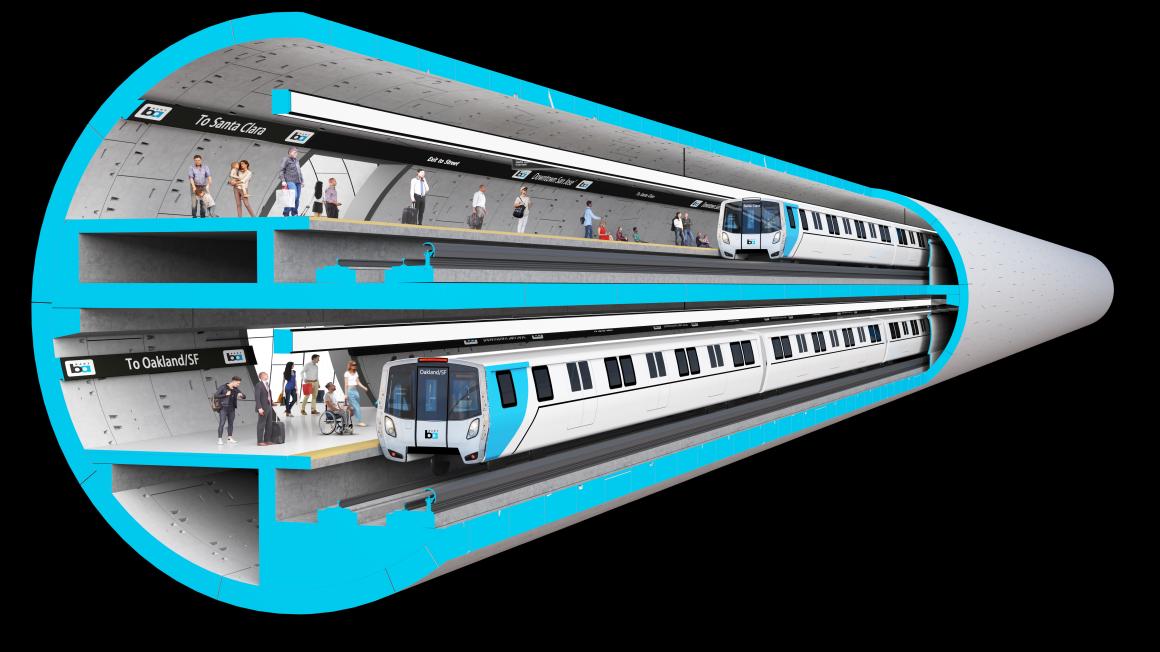In the next few months, VTA anticipates awarding the first and largest contract for the BART Silicon Valley Phase II Project. While VTA is still in the midst of securing federal funding, the Federal Transit Administration (FTA) encouraged VTA through a Letter of Intent (LOI) to continue certain project activities, including advancing design and engineering, issuing construction contracts to receive contractor bids, and procuring long lead items as required.
In a statement from October 2021, VTA recognized that FTA developed a potential project cost that reflected current unknowns, in addition to sufficient contingency to compensate for those unknowns, due to the preliminary nature of the design. “FTA, in collaboration with VTA, has conducted a rigorous risk assessment that identifies uncertainties and provides a framework for VTA’s project team to tackle and mitigate the risks,” said Carolyn Gonot, VTA General Manager and CEO.
The LOI also defined the next steps required by VTA to ultimately receive federal funding with FTA's intention to obligate up to $2.287 billion or 25 percent of the final project cost, whichever is less. Refining the project cost and schedule that factor in design progression and contractor bids is most critical. This will help respond to items identified in FTA’s Risk Assessment, a typical process the FTA uses for funding applicants.
Assessing Risk
Risk assessments are routine for projects applying for federal funding and aids the FTA in determining a project’s readiness to receive grant funds and advance into the construction phase.
A risk workshop was conducted by the FTA in May 2021. The assessment was based on information included in VTA’s funding application from February 2021, not on an independent cost estimate or schedule prepared by FTA. The analysis performed by FTA focused on preparing for the worst case scenario in regards to cost and schedule, and proceeding with efforts to work towards a best case scenario. Even with worst case projections of a project cost of $9.1B and schedule of June 2034, it did not dissuade FTA’s decision to advance the project in the funding process.
Early Projections
VTA’s initial projected schedule, with a 2030 completion date, was developed with substantial industry participation. This schedule encourages future contractors to identify further innovations to deliver the project as quickly as possible. VTA also performed a schedule assessment, factoring in possible delays and external impacts, which indicated a potential completion date of 2032. This effort was geared towards identifying all risks that could impact the schedule so that VTA could proactively develop response plans to avoid, mitigate and/or transfer those risks as the project advanced. In addition, risk contingency is included in the project budget should any of the identified schedule risks occur.
VTA prepared its initial schedule in early 2020, prior to the onset of the COVID-19 pandemic. FTA’s schedule assessment, conducted in 2021, considered more than a year of additional insight regarding the market conditions impacted by the pandemic including potential labor and material shortages, and general macro-economic market conditions that include unforeseen labor and material shortages. This resulted in FTA’s worst case 2034 forecast. Since this project spans a decade, it is likely that the near-term impacts resulting from the COVID-19 pandemic may not result in the long-term impacts as considered by either VTA or FTA.
Refining Cost and Schedule
FTA’s LOI allows VTA two years to refine the project’s cost estimate and schedule with consideration of the of FTA’s risk assessment. As such, as VTA issues the remaining design-build contracts and incorporates various innovations proposed by the contractors, VTA will develop an updated schedule and cost estimate. This will factor in ongoing contractor feedback as well as evaluate mid-term and long-term outlook from the continuously evolving post-pandemic market pressures based on trends in Bay Area and nation-wide.
As presented at recent VTA Board meetings, VTA has extended our tunnel and trackwork contract schedule by 10 months based on feedback from the shortlisted contractors. This extension incorporates the latest industry feedback on the durations for the Tunnel Boring Machine manufacturing, delivery and mining. The contractor feedback builds on the substantial data collection, research, and industry outreach VTA has performed over the last several years to validate the tunnel production rates included in the project schedule. In addition to being responsive to our shortlisted contractors, we conclude that this schedule will benefit the integration with the other construction packages.
A December blog post and FAQ’s go into detail about the basis for VTA’s selection of the single bore as the best option for the BART Phase II project, and implications of changing course to the twin bore alternative at this time which would significantly impact the overall project schedule.
VTA remains committed to delivering this extension of the BART system in the most expeditious, cost effective, and least disruptive way possible to the community. With continued support and commitment from FTA, VTA looks forward to continuing to work with stakeholders and the public to make this project the best it can be over the next year as it moves into final design and construction.
